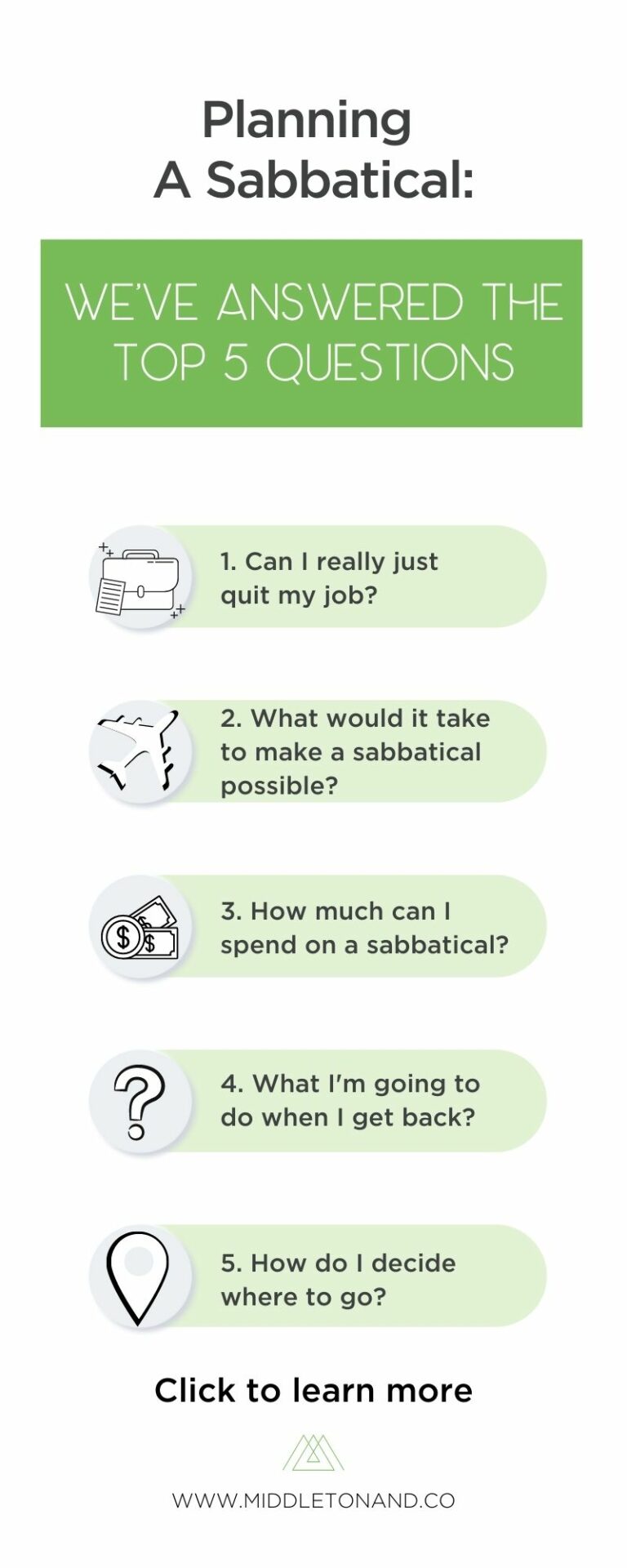Do you dream of taking a sabbatical? Have you been entertaining the idea of quitting your job and traveling for a year, or maybe two? Are you feeling exhausted in your current job, dreaming of the day you can just.take.a.break? You can feel it’s time to go but you’re not sure how to do it, where to start, how to plan for it… We’ve answered the top questions regarding sabbatical planning in this article!
We both took sabbaticals and we agree that it has been one of the best experiences of our lives. We learned a lot about the world…and ourselves! (PS: we share some of the biggest lessons we’ve learned from taking a sabbatical in this blog)
Today, we want to help YOU live that amazing experience for yourself! As financial planners, we help you plan your dream sabbatical by making smart financial decisions to support your journey.
We know it can be scary and you may have A TON of questions. So if you’re dreaming of that sabbatical, but you’re not quite sure that you can make it happen yet, keep reading; this post was written with you in mind!
We’ve answered the top 5 questions about planning a sabbatical!

Question #1: Can I really just quit my job?
Does quitting your job freak you out? That’s totally understandable. We often look at our job as (what needs to be) the most stable thing in our life. It brings us comfort and security (and status and income, and identity…)
We often let our jobs rule how we spend our time and our lives! But the comfort and security can over time turn into a lack of inspiration, resentment, and even burnout.
It’s important to identify the reasons you’re scared to quit:
- Are you afraid of running out of money? We will look deeper into that in question #3.
- Are you afraid of ruining your career and having trouble finding work again afterward? We look deeper into that in question #4 .
- Or is something else holding you back?
So can you really just quit your job to go travel? Isn’t that irresponsible? We are strong believers (and living proofs) that a sabbatical can be an intentional part of one’s career. It just takes some planning – see #2 below.
Learn more about the benefits of having a non-traditional career path here.
Just like your studies have supported you, your sabbatical can help you gain important skills that can help you grow both on a personal and professional level.
How can you know whether it’s time to move on from your current job? Download our free guide to get the clarity you need right now. You’ll get questions and exercises to help you know what you really want.
Question #2: What would it take to make a sabbatical possible?
You’re dreaming of leaving but you can’t figure out how other people make it happen. You’ve got a house to take care of, benefits at work you depend on, daily expenses you can’t reduce…
When you look at other people on the other side of the world you’re wondering what’s their secret?
Well, we don’t know for everybody but do you want to know our secret and how we made it happen?
PLANNING!
If you’re waiting for the best time to quit your job and take that sabbatical, you might be waiting for a loooong time. What’s important isn’t so much when you do it, but more how you plan for it!
Leaving for a year – or more – isn’t something we did on a whim. We recommend planning for your sabbatical a few years ahead. This will allow you to get ready mentally and financially, and also in your personal life, and yes at work! Planning ahead can help you leave with peace of mind!
This is exactly what we help you do – plan your dream sabbatical so you’re in a place to enjoy the time away that you’ve worked toward.
Here are some things we do in the planning phase:
- Assess your current financial situation by:
- Consolidating all of your financial information into one place
- Helping you understand your total benefits at your current job
- Review and help you detail out your sabbatical goals so they’re clear and tangible by:
- Creating financial planning scenarios to help you see your sabbatical in the broader picture of your career and life
- Discussing potential savings, investment, and account strategies that are applicable to your situation
- Identifying specific challenges and options for possible solutions
- Track your progress
- Continually remind you of the reason behind your plan to take a sabbatical
- Share additional inspiration and tools to get you to the day of your departure and beyond
- Plan for the implementation of any strategies we’ve discussed by:
- Making sure next steps are clear
- Helping to put tactics we’ve talked about into action through account and investment services
One thing we believe is really important is to not wait to plan it! Even if you see yourself leaving in five years or more, don’t wait around. Starting the planning process earlier rather than later can set you up for success.
Learn more in our blog “Go on a sabbatical in the next 5 years”

Question #3: How much can I spend on a sabbatical to still have enough for all my other goals?
There isn’t a universal budget for when you’re planning a sabbatical. This will depend on your current situation, your goals during your sabbatical, if you wish to still work or stop completely during your time away, and so on!
Your sabbatical (and its budget) is going to be very personalized to your needs and your desires. This is something we look into deeply in the planning phase. We want to make sure it’s as comfortable as YOU want it.
For some, taking a sabbatical means staying in hostels to save money and meet people.
For others, it will be to spend at least a few weeks at a luxurious retreat.
For one person it could be to travel to Europe while for someone else it will be to hop around Southeast Asia.
The activities you want to do, the lifestyle you want to embrace, and the countries you decide to live in also will have an impact on your budget.
It also matters what kind of plans you have upon your return. How much of a savings buffer would make sense for you, to give you time to reintegrate back into working life? What other life goals do you have in mind? Making sure to take these aspects into account is also very helpful in feeling good about your sabbatical budget.
This is why planning your sabbatical ahead of time is so helpful. We help our clients set goals to understand the type of sabbatical they want to experience, and how it fits into the broader picture, so they can be better prepared for it!
And it’s not just about coming up with a budget. It’s also about thinking creatively to make everything in the plan come together. For example, your sabbatical doesn’t have to be funded entirely by your savings account. Things like understanding your employer-sponsored benefits before you quit your job, reviewing your contributions to your employer retirement savings plan, incorporating smart tax planning, or using your health-saving account are possible ways to help fund your sabbatical!
Question #4: How am I going to figure out what I’m going to do when I get back?
Returning to your “prior life” can be a challenge for some people. After an extended break, we notice people are often a little different than when they left (that’s the whole point, right?). This is why giving some thought to your possible future directions before and during your time away can be helpful, if not inspiring.
During your sabbatical, you’ll likely live experiences that will change the way you look at your life. So yes, coming back to your old routine might be uncomfortable, or maybe even something you won’t want to do. But it doesn’t have to be a negative experience.
It’s for sure a transition, but the way you prepare to embrace that transition can make a huge difference.
For example, it’s important to plan time to land back home and readjust.
Maybe you’re planning on going back to your old job, or maybe you’ve decided to start your own business or look for a totally different type of work. No matter what you decide, take the time at the end of your sabbatical to check in with yourself and to make sure you’re feeling aligned with your decisions.
You can go back through any journals, pictures, videos from your sabbatical, and notice how you feel while looking at them. You can think about who you were in your best moments while away, and how you can bring those qualities into the next phase of your life once you return home. There may be a relatively clear path for you at that point, whether it’s within the work you already do or something completely new.
It’s also important you realize that your experience during your sabbatical is a HUGE asset. This is not a “gap in your resume”. On the contrary, it can set you apart! Be prepared to explain to your future employer how beneficial this experience has been and how it has improved your professional skills as well. Learn more about how to prep for a job interview after your sabbatical here.

Question #5: How do I decide where to go?
There isn’t ONE best decision! Once again it’s your sabbatical, and it’s your time to really follow your intuition and go where you’re being called to go.
Defining the goal of your sabbatical is a good first step – what is it that makes you want to take a sabbatical? What kind of sabbatical do you wish to experience? Do you want to volunteer? To learn new skills or speak another language? To take better care of yourself? To disconnect from your busy life?
Once this is clear, it can be easier to find destinations that are aligned with your goals.
Check out our blog about the Blue Zones for locations that promote a healthy lifestyle or here are some favorite destinations to inspire you.
One additional tip is to consider how detailed you want your itinerary to be. With extended time off, it can be nice to have flexible travel dates, where you’re able to stay longer in a destination you like, or move on to a new one once you’ve experienced what you wanted in a particular place. We also had some good experiences taking recommendations from others we met while traveling. Having an open schedule allowed us to check out some places we hadn’t considered (or even heard of) before we were away.
From our perspective, having a general idea of which region to explore, or what city to use as a homebase for additional travel, can be a good start. From there, the research, planning, and discovery of new places is part of the overall sabbatical experience!

We’re so excited that you’ve decided to at least explore the idea of going on a sabbatical. We wouldn’t be here if we weren’t convinced this is an amazing opportunity! We hope these answers help you feel a little more prepared and confident about the idea of taking a sabbatical.
We hope we’ve answered your top questions regarding sabbatical planning. If we didn’t answer one of your questions, send it to us at clientservices@middletonand.co, we’d love to help!
If you’re ready to take the next step in pursuing your dream, contact us today. We offer individualized support with smart financial and sabbatical planning made for you, your dream, and your unique situation!
Click here to schedule a discovery call now.
Like this article? Make sure to Pin It so you can go back to it later!



